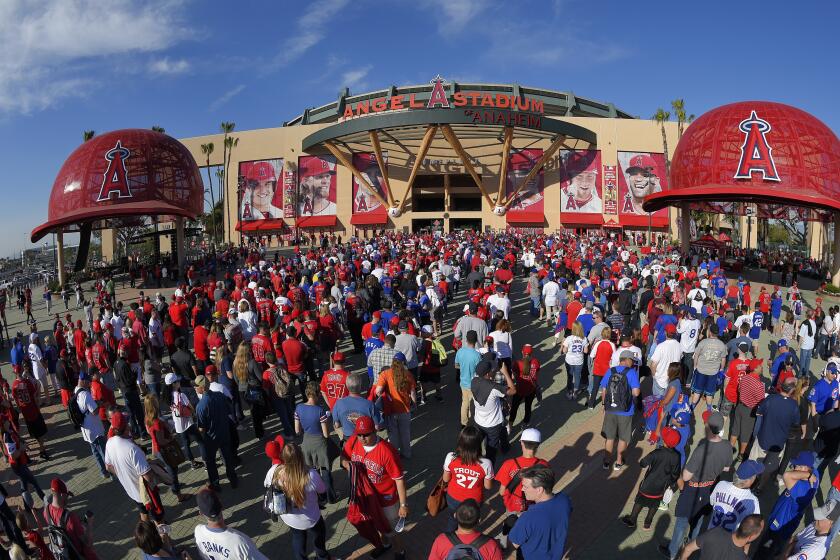‘Going, Going . . . ‘ : Collectible Cars Go on Block Today in Exhibition Center at the Big A
- Share via
A little bit of Reggie Jackson is returning to Anaheim this weekend as the former California Angels slugger puts three cars from his classic auto collection on the block at an auction being held in the new Anaheim Stadium Exhibition Center.
Some of the spirit of Liberace will be there too when several cars from the late entertainer’s collection are put up for bid.
The auto auction, a first for the stadium and for organizers John Smith and Ron Henricksen of Laguna Hills, is one of about 200 classic and collectible car auctions held annually in this country. The events form a $1-billion-a-year industry aimed at satisfying the desire to own rare, restored, notorious or just plain good-looking cars.
Among the offerings in Anaheim today and Sunday are a passel of Plymouth, Ford and Chevrolet “muscle cars” from the 1960s and early ‘70s, several classic 1955, ’56 and ’57 Chevy hardtops and convertibles (including two from Jackson’s collection), a fully restored 1967 Corvette roadster with a 425 cubic-inch engine and a 1985 Stutz Bearcat replica made for the King of Morocco.
As U.S. auto auctions go, according to auctioneer Mitchell Kruse, the event, dubbed the “Anaheim ’89 Automobile Extravaganza” by its promoters, is a middle-of-the-road affair with a modest selection of autos.
“But the venue at Anaheim Stadium is great and having nearly 300 cars registered for a first-time event shows there is a lot of potential,” Kruse said. “I’d expect this to have 600 cars next year and to become one of the premier events on the auction calendar.”
While he certainly stands to benefit if the Anaheim auction does become an ever-larger annualevent, Kruse knows what he is speaking about.
His firm, Indiana-based Kruse International, is the largest auto-auction company in the country, putting on an average of one major sale a week. In 1988, Kruse auctioned off $250 million worth of cars. This year, he said, he expects the total to hit $300 million.
One thing that makes the Anaheim event stand out, Kruse said, is that organizers Smith and Henricksen are trying to broaden the appeal beyond car enthusiasts and wealthy collectors.
The 20,000 or so spectators expected to attend the two-day event will be able to browse through a “car corral,” some 40 vendor booths featuring new car exhibits, auto accessories and even a fingernail sculptor.
“We go to a lot of auctions and have noticed that the bidders usually bring wives and friends and families along and then leave them while they go look at cars,” said Smith, who also is president of International Speedway, the organizer of the weekly speedway motorcycle races at Orange County Fairgrounds.
“So we were at one event recently and there was a guy doing fingernails at $99 a pop, and the women were lined up waiting. They didn’t have anything else to do,” Smith explained.
So Smith and Henricksen formed Rojo Productions Inc. to put on the auction and figured they would offer something for everyone.
“We have been wanting to do a complete, life-style auto event in conjunction with an auction for a long time,” said Henricksen, himself a Corvette collector and motocross promoter.
The partners figure that they spent about $100,000 to organize and promote this weekend’s event. Despite the outlay, they are still likely to come out ahead.
A $300-per-car registration fee for the auction should gross almost $90,000. Added to that will be a share of the commissions collected on each car sold in the auction. In addition, there is a $45-per-car fee for about 200 cars expected to be offered for sale by their owners in the used car corral, plus fees collected from the vendors.
Auctioneer Kruse said he expects several of the cars being offered this weekend to go for $100,000 or more, adding that the average of all 300 cars being auctioned should be about $15,000--for a total auction gross of about $4.5 million.
And if that sounds a little much, consider this:
One of the cars being offered is a little red 1957 Chevrolet Bel Air convertible making its fourth Southern California auction appearance since early September.
The car sold for $22,000 at an auction in Irvine that month, sold again for $30,000 at an auction in Palm Springs on Oct. 14 and for $34,000 at a Woodland Hills auction one week later.
Smith said he expects it to go for $36,000 or more this weekend.
“The market is phenomenal,” he said. “We see cars just going up and up.”
One of the factors driving the market is a renewed interest by investors in tangible collectibles in the wake of recent volatility in the stock market. In addition, Kruse said, the improving economies of Europe and Japan have created huge stores of disposable income overseas just looking for things to invest in--and American cars especially have always been a favorite collectible in Asia and Europe.
“Every week, about 1,000 collectible cars are shipped from the United States to Japan and Europe,” Kruse said.
Smith noted that at least two major Japanese corporations are sending buyers to the Anaheim auction this weekend. “We got calls from them asking if it was OK to bring cash,” he added.
The five elements of value in a classic or collectible car, Kruse explained, are rarity, condition, eye appeal, horsepower and historic significance.
In translation, that means that a car that is one of a kind generally is worth more than a vehicle that is just one of a bunch; a car in perfect, showroom condition is worth more than one with rusty chrome and an oily engine, and an original car is worth more than a restored one; a car that people like the looks of is worth more than one that is ugly, and convertibles are usually worth more than hardtops; a car with a bigger engine is more valuable than the same car with a smaller engine, and a car with a history is more valuable than one without.
In that last element, the historic significance could be in the car itself--the 1957 Chevrolet, for example, is historic because it is a breakthrough design--or in its owner.
“ ‘Bad guys’ cars are worth more than ‘good guys’ cars,” Kruse said, “but any car with a famous owner is worth more that a comparable car owned by the guy down the street.”
He said that the three cars Jackson has registered to auction, a 1955 Chevy two-door hardtop, a 1957 Chevy Bel Air hardtop and a 1967 Corvette, “are worth about 30% more just because they are owned by Reggie Jackson.”
More to Read
Go beyond the scoreboard
Get the latest on L.A.'s teams in the daily Sports Report newsletter.
You may occasionally receive promotional content from the Los Angeles Times.










